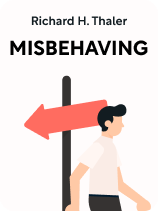

This article is an excerpt from the Shortform book guide to "Misbehaving" by Richard H. Thaler. Shortform has the world's best summaries and analyses of books you should be reading.
Like this article? Sign up for a free trial here.
What’s constrained optimization in economics? What are the arguments against this economic process?
In Misbehaving, Richard H. Thaler focuses on the arguments against the premise of constrained optimization, highlighting three types of counterexamples to this premise. This is to show the salience of non-economics factors in our decision-making process.
Continue reading to dive deeper into why Thaler is against constrained optimization.
Argument #1: People Perform Mental Accounting
Thaler’s first argument against the premise of constrained optimization in economics is that people perform mental accounting—that is, they think about money in ways that don’t optimize their budgets. And although Thaler lists an array of examples of mental accounting, we’ll focus on three key ones: the endowment effect, the sunk cost fallacy, and common approaches to budgeting.
Example #1: The Endowment Effect
Thaler first explains that many consumers fall victim to the endowment effect: They overvalue their current possessions, even though they accurately value items they don’t own. For example, imagine that a consumer purchased a Cuban cigar several years ago for $25 that’s now worth $100. In this situation, many consumers would choose to smoke this cigar rather than sell it, even though they wouldn’t consider buying the same Cuban cigar for $100 if they didn’t already own it.
But Thaler points out that this set of preferences is logically inconsistent: If you choose to smoke the cigar rather than sell it, that shows that you do value the cigar at least $100, since you could easily sell it for $100 instead of smoking it. If consumers obeyed the premise of constrained optimization, their economic preferences should be consistent. After all, they would recognize that they could sell the cigar for $100 to increase their budget and thus would only smoke the cigar if it was truly worth $100 to them.
Thaler notes, however, that many mainstream economists believed that although the endowment effect might occur in individual cases, it could never occur in a market setting. These economists reasoned that in an efficient financial market where assets were accurately priced, consumers wouldn’t exhibit irrational behavior like the endowment effect.
To that end, Thaler, along with Nobel laureate Daniel Kahneman, designed an experiment testing the endowment effect in a miniature market. In a class at Cornell, Thaler and Kahneman provided half of the students with a Cornell mug, then allowed the students without the mug to make offers to purchase one from their classmates. If the market were rational, the sellers’ reservation price (the minimum offer they would accept) should align with buyers’ purchase price (the amount offered to purchase the mug)—after all, rational sellers wouldn’t value items higher because they happened to own them.
However, Thaler and Kahneman found the opposite: Sellers consistently had higher median reservation prices (about $5.25) than buyers’ median purchase price (between $2.25 and $2.75). This experiment—which has been repeated with consistent results—shows that sellers’ valuation of mugs is consistently higher than buyers’ valuations, a clear example of the endowment effect in a market setting.
Example #2: The Sunk Cost Fallacy
In a similar vein, Thaler points out that many consumers commit the sunk cost fallacy: They treat money that has already been lost as relevant to financial decisions. For example, imagine that you purchase a $20 ticket to a movie, find it unbelievably boring after the first 30 minutes but decide to finish the movie so you don’t “waste” the $20. In this case, you’re treating the sunk cost of $20 as relevant to your decision, when in actuality you’ll be out the $20 either way.
Thaler explains that committing the sunk cost fallacy violates the premise of constrained optimization because it involves treating money no longer in your budget as if it were part of your budget. In the previous example, the $20 spent on the ticket is no longer part of your budget and thus shouldn’t factor into your decision to continue watching the movie.
Example #3: Budgeting
Another common form of mental accounting, Thaler relates, involves budgeting: Consumers often create separate budgets for separate categories of spending. For example, a family might have one budget for monthly groceries, one for its mortgage, one for entertainment, and one for insurance payments.
Although budgeting doesn’t necessarily violate constrained optimization, Thaler points out that it often does in practice when we treat budgeting categories as independent of one another. For instance, if you had additional money in your entertainment budget at the end of the month, you might splurge on an expensive experience and justify it as being within your budget. In so doing, you would fail to evaluate whether purchasing that expensive experience maximizes your overall budget, since the money you spent might be better spent elsewhere.
Argument #2: People Care About Fairness and Cooperation
While Thaler’s examples from mental accounting show more mundane ways that consumers often act irrationally according to traditional economic theory, other experiments reveal more specific situations in which we consider allegedly irrelevant factors in our economic decision-making. In this section, we’ll examine Thaler’s second argument against the premise of constrained optimization—that consumers are concerned with fairness and cooperation, even when these concerns conflict with budget optimization—as shown by two experiments: the ultimatum game and the prisoner’s dilemma.
Experiment #1: The Ultimatum Game
Thaler argues that the ultimatum game reveals that consumers are concerned with fairness, even at the expense of budget optimization. The ultimatum game, he explains, features two players and a fixed amount of money ($10, in his initial experiment). One player, the Proposer, is allowed to propose how the money should be distributed between the two players—the Proposer may, for instance, propose keeping $8 and giving the other player $2. The other player, the Responder, is allowed to accept or reject the Proposer’s offer, with the caveat that rejecting the offer means neither player gets any money.
As Thaler explains, if Responders were solely concerned with budget optimization, they should take any offer that the Proposer makes. After all, $2 is better for economic purposes than $0, even if accepting a $2 offer means the Proposer gets $8. In reality, however, Responders often rejected offers they deemed unfair—they typically rejected offers below 20% of the pie. Moreover, Thaler notes that even when researchers ran the ultimatum game with larger pies in impoverished countries, where the stakes are exponentially higher, the results were the same: Responders typically reject offers below 20%, even when the pie is equivalent to three months’ income.
Experiment #2: The Prisoner’s Dilemma
In a similar vein, Thaler argues that variants of the prisoner’s dilemma suggest that individuals often prefer cooperating with others over maximizing their own well-being. Thaler explains that, in the classical prisoner’s dilemma, two prisoners arrested for collaborating on a crime are interrogated and allowed to inform on their collaborator or remain silent. If both prisoners remain silent, they will only spend one year in jail for a small infraction; if both prisoners inform on each other, they will each spend five years in prison; and if one prisoner informs but the other doesn’t, then the informer will get off scot-free while the other will spend 10 years in prison.
As Thaler relates, if the traditional economic assumption that individuals maximize their own well-being were true, both prisoners would inform on each other. To see why, imagine that you’re one of the two prisoners. Logically, there are two options: Either your collaborator will inform on you, or they won’t. If they do inform on you, you should likewise inform on them, since doing so would reduce your sentence from 10 years to five years. If they don’t inform on you, you should still inform on them, since doing so would reduce your sentence from one year to zero years. Regardless, standard economic theory dictates that you should inform.
However, Thaler says, when variants of the prisoner’s dilemma are performed in the laboratory, we find a different result: 40-50% of prisoners (that is, those playing the role of prisoners) refuse to inform on each other, instead remaining silent even if it means spending a year in jail. Thus, it seems that prisoners are interested in cooperating with each other, even though standard economic theory says that cooperation is irrelevant.
Argument #3: People Exhibit Present Bias
Thaler’s third argument holds that we exhibit a present bias—a preference toward smaller immediate rewards over larger future rewards—that conflicts with the premise of constrained optimization because it decreases our long-term economic utility. To show as much, he examines how this bias manifests itself in children as well as adults.
Thaler first examines psychologist Walter Mischel’s famous experiment testing children’s willpower in a laboratory setting. In Mischel’s experiment, children are given the choice between one marshmallow now and two marshmallows in 15 minutes, with the caveat that they have to spend these 15 minutes in a room with access to the single marshmallow. Thaler relates that, on average, children couldn’t last the 15 minutes: They lasted an average of 11 minutes before eating the single marshmallow. If children rationally maximized economic utility, however, they would wait 15 minutes, since two marshmallows are clearly worth more than one.
According to Thaler, adults likewise exhibit present bias—that is, they irrationally place more weight on short-term economic gains than equivalent long-term gains. He argues that adults often fall victim to a specific form of present bias known as hyperbolic discounting, in which they prefer immediate rewards to future rewards, but they don’t differentiate between comparable rewards at different dates in the far future. For example, if you’re offered tickets to the Superbowl either for this year or 10 years in the future, you’ll likely prefer the tickets to this year’s Super Bowl. By contrast, if you’re offered the choice between tickets to the Super Bowl 10 years in the future or 11 years in the future, you’ll likely lack the strong preference for the earlier tickets.

———End of Preview———
Like what you just read? Read the rest of the world's best book summary and analysis of Richard H. Thaler's "Misbehaving" at Shortform.
Here's what you'll find in our full Misbehaving summary:
- Why the theory of traditional economics rests on a faulty foundation
- How consumers actually behave in economic situations
- Real-world cases of behavioral economics helping consumers





